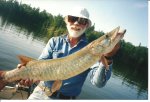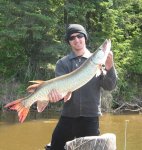Re: Muskies?
I think you may want a rod that's heavy weight with a medium to medium-fast action, around 7 - 8 ft. If you really get into it, you may end up tossing some pretty hefty baits, so take that heavy lure weight into consideration. Most serious muskie anglers will choose a casting setup over a spinning rod. Make sure your rod and reel combo feels good in your palm, because musky fishing involves endless casting (unless you can troll for them, which is a very deadly tactic also). I would use 40 lb. braided line with a wire leader leader at least 12 inches long if not longer. What to use for bait, now that's so variable you could spend a dozen lifetimes figuring that out. As stated, the Mepps and Rapala are surefire standby baits for both species.
Doing your homework in regards to the particular body of water you will fish is paramount. Talk to local bait shops, and talk to all of them. It's in their best interest to help you catch fish, so they'll often have a wealth of knowledge to share. Learn the body of water you want to fish and learn it well. Get a detailed bathymetric map and study it, taking note of key structures like creek channels running through a shallow flat with weeds on the edge where it drops off into deeper water, river mouths with current bringing food into the lake, rocky bars and pinnacles isolated from the shore and protruding up from deeper water, etc... Find good cover, like cabbage weeds, and shorelines that are littered with downed trees, fish cribs, and the like.
Also contact the local agencies who carry out research and management where you intend to fish (i.e., Dept. of Fish & Game, Natural Resources, etc...). Ask to speak with the research biologist that handles the field work and actually works out on the water. If you're lucky, you may even find someone who works primarily with muskies and pike. It is ideal when you can find someone who has done hands on work with the fish instead of a "desk biologist". Field biologists will often be able to tell you where they have personally had the most luck netting or electrofishing and when. They will likely have data on "catch per unit effort" or CPUE which can tell you where and when your efforts are most likely to be met with reward. Some agencies even examine stomach contents when sampling a fishery, which is invaluable when choosing what bait to use. Nothing gives better proof of what the muskies eat on a particular body of water than pumping their stomachs. My point is that biologists are a gold mine of information and most are more than willing to aid anglers.
That being said, it's not always so simple. The very best thing a musky angler can do is spend as much time as possible on the water. A healthy dose of luck never hurts either! Strange things happen in fishing and you never know for sure what could work. Sometimes, it's the least likely thing that ends up being a hot lure, so try anything you feel like using. I've seen people catch 20 lb pike in Alaska by literally hooking an empty Budwiser can and tossing it into the shallow horsetails, and also seen similar pike taken from Lake Superior on tiny 1/16 oz. jigs. I once saw my friend land a respectable musky on a rubber worm while fishing for largemouth bass, casting from shore at a boat landing in northern Wisconsin.
Just fish a lot where they live and you will eventually catch one. Good luck, and tight lines!





















